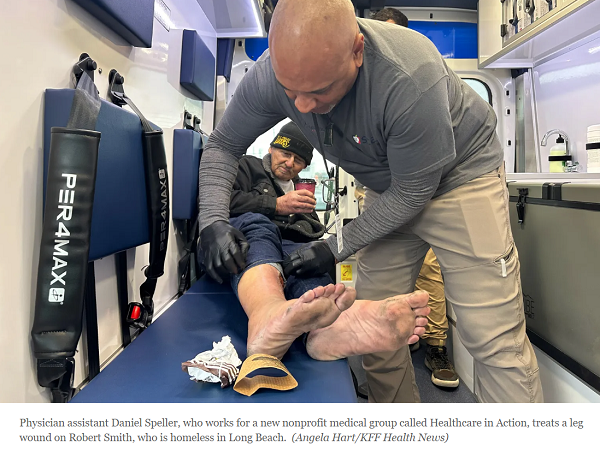A California Medical Group Treats Only Homeless Patients — And Makes Money Doing It
By Emily Alpert Reyes; Staff Writer
August 20, 2024
 LOS ANGELES — They distribute GPS devices so they can track their homeless patients. They stock their street kits with glass pipes used to smoke meth, crack, or fentanyl. They keep company credit cards on hand in case a patient needs emergency food or water, or an Uber ride to the doctor.
LOS ANGELES — They distribute GPS devices so they can track their homeless patients. They stock their street kits with glass pipes used to smoke meth, crack, or fentanyl. They keep company credit cards on hand in case a patient needs emergency food or water, or an Uber ride to the doctor.
These doctors, nurses, and social workers are fanning out on the streets of Los Angeles to provide health care and social services to homeless people — foot soldiers of a new business model taking root in communities around California.
Their strategy: Build trust with homeless people to deliver medicine wherever they are — and make money doing it.
“The biggest population of homeless people in this country is here in Southern California,” said Sachin Jain, a former Obama administration health official who is CEO of SCAN Group, which runs a Medicare Advantage insurance plan covering about 300,000 people in California, Arizona, Nevada, Texas, and New Mexico.
“The fastest-growing segment of people experiencing homelessness is actually older adults,” he said. “I said, ‘We’ve got to do something about this.’”
Jain’s organization three years ago created Healthcare in Action, a medical group that sends practitioners onto California’s streets solely to care for homeless people. It has grown rapidly, building operations in 17 communities, including Long Beach, West Hollywood, and San Bernardino County.
Since its launch, Healthcare in Action has cared for about 6,700 homeless patients and managed roughly 77,000 diagnoses, from schizophrenia to diabetes. It has placed about 300 people into permanent or temporary housing.
Street medicine in most of the country is practiced as a charitable endeavor, aimed at serving a challenging patient population failed by traditional medicine, its proponents say. Living transient, chaotic lives, homeless people suffer disproportionately from mental illness, addiction, and chronic disease and often don’t have health insurance — or don’t use it if they do.
That makes designing a business around caring for them a risk, insurance executives and health economists say.
“It’s really innovative and entrepreneurial to take all this energy and grit to try and improve things for a population that is too often ignored,” said Mark Duggan, a professor of economics at Stanford University who specializes in homelessness and Medicaid policy. “Financial incentives matter massively in health care. It’s everything.”
An estimated 181,000 people were homeless in California in 2023 — about 30% of the nation’s total. The number living outside, more than two-thirds of California’s total, increased 6.9% over the previous year.
The state’s leaders, including Democratic Gov. Gavin Newsom, have struggled to make inroads against the mounting public health and political crisis — despite marshaling unprecedented taxpayer resources.
“We have a huge problem on our hands, and we have a lot of health plans and municipalities saying, ‘We need you,’” Jain said.
On the Streets
On a cloudy April morning in Long Beach, Daniel Speller navigated his mobile medical van among the tents and tarps that crowded residential streets, searching for a couple of homeless patients. A physician assistant for Healthcare in Action, Speller said he was particularly worried about the badly infected wounds they developed on their limbs after they used the street drug xylazine, an animal tranquilizer often mixed with fentanyl.
“These wounds are everywhere. It’s really bad,” Speller said. If infections progress, they can require toe, foot, or arm amputations.
“Man, this one is still so deep,” Speller said as he peeled denim pants from the swollen leg of Robert Smith, 66.
After cleaning and wrapping Smith’s leg, Speller asked him if he needed anything else. “I lost my food stamps,” Smith replied.
Within the hour, Speller’s team of social workers and nurses had summoned…
[READ THE COMPLETE ARTICLE HERE]
